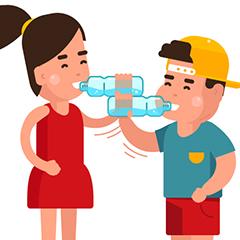Plastics
Plastics play a major role in the modern era. We microwave our food in plastic containers. We carry plastic water bottles on hikes and biking trips. We use them to make all kinds of things — from furniture to toys. They offer convenience, flexibility, and strength. The bad news is that they can release harmful toxins into our food, water, and the environment.
Because of the widespread use of plastics, experts are taking a closer look at their possible health risks. The chemicals that people are most concerned about are phthalates and bisphenol A (BPA). Today, more and more plastic products that used to be made with bisphenol A no longer contain it. You may have heard of BPA-free bottles or food containers.
How can people be exposed to chemicals in plastics?
Some plastic containers can release chemicals into the things they’re holding — like food and drinks. When people eat or drink what was in the container, they can be exposed to (come in contact with) the chemicals in the plastic. This happens most often if the food or drinks are heated in plastic containers.
It’s also possible to be exposed to chemicals found in plastics through air, dust, and water.
How can plastics affect my health?
Early studies about the health effects of chemicals from plastics show that they may affect the:
- Brain
- Endocrine system (the system that controls hormones, or the chemicals that regulate metabolism)
- Immune system (the system that helps keep you from getting sick)
- Reproductive systems (the male and female systems that allow us to have babies)
Evidence also suggests that chemicals from plastics can cause behavior problems.
These health risks are worse for babies and children. There’s also concern about the health effects of using plastics over many years.
Some content courtesy of the National Library of Medicine.




